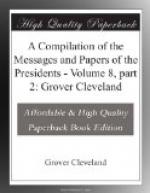LETTER FROM THE PRESIDENT ELECT.
The President of the Senate communicated the following letter from the President elect of the United States:
City of Washington, March 2, 1809.
Hon. John Milledge,
President pro tempore of the Senate.
Sir: I beg leave through you to inform the honorable the Senate of the United States that I propose to take the oath which the Constitution prescribes to the President of the United States before he enters on the execution of his office on Saturday, the 4th instant, at 12 o’clock, in the Chamber of the House of Representatives.
I have the honor to be, with the greatest respect, sir, your most obedient and most humble servant,
James Madison.
FIRST INAUGURAL ADDRESS.
Unwilling to depart from examples of the most revered authority, I avail myself of the occasion now presented to express the profound impression made on me by the call of my country to the station to the duties of which I am about to pledge myself by the most solemn of sanctions. So distinguished a mark of confidence, proceeding from the deliberate and tranquil suffrage of a free and virtuous nation, would under any circumstances have commanded my gratitude and devotion, as well as filled me with an awful sense of the trust to be assumed. Under the various circumstances which give peculiar solemnity to the existing period, I feel that both the honor and the responsibility allotted to me are inexpressibly enhanced.
The present situation of the world is indeed without a parallel, and that of our own country full of difficulties. The pressure of these, too, is the more severely felt because they have fallen upon us at a moment when the national prosperity being at a height not before attained, the contrast resulting from the change has been rendered the more striking. Under the benign influence of our republican institutions, and the maintenance of peace with all nations whilst so many of them were engaged in bloody and wasteful wars, the fruits of a just policy were enjoyed in an unrivaled growth of our faculties and resources. Proofs of this were seen in the improvements of agriculture, in the successful enterprises of commerce, in the progress of manufactures and useful arts, in the increase of the public revenue and the use made of it in reducing the public debt, and in the valuable works and establishments everywhere multiplying over the face of our land.
It is a precious reflection that the transition from this prosperous condition of our country to the scene which has for some time been distressing us is not chargeable on any unwarrantable views, nor, as I trust, on any involuntary errors in the public councils. Indulging no passions which trespass on the rights or the repose of other nations, it has been the true glory of the United States to cultivate peace by observing justice, and to entitle themselves to the respect of the nations at war by fulfilling their neutral obligations with the most scrupulous impartiality. If there be candor in the world, the truth of these assertions will not be questioned; posterity at least will do justice to them.




